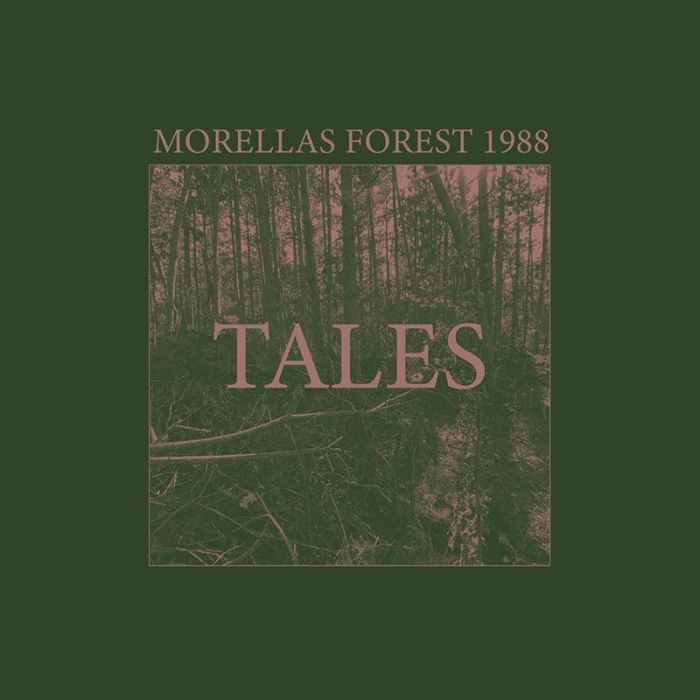Tales by Morella’s Forest (Review)

It’s a classic rock n’ roll tale. A group of kids start a band. They play some shows, generate some buzz, and get noticed by a record label. They head into the studio to record their debut album… only for the label to shut down before anything’s released. The band dissolves, the tapes disappear into someone’s basement or attic, and aside from the occasional whisper on a message board or Facebook group, there’s precious little evidence that any such album actually existed.
But every so often, history comes full circle and things get a chance to be put right. One such moment occurred last February, when Joy Electric’s Ronnie Martin tweeted a photo of several old tapes. A random photo that, for some of us, was one of the year’s biggest music-related announcements.
A quick Christian music history lesson: Back in 1988, Ronnie and his brother Jason (Starflyer 59) were in a band called Morella’s Forest with their friend Randi Lamb. (Just to clarify, this was not the same Morella’s Forest that released several albums on Tooth & Nail Records in the mid-to-late ’90s.) Unfortunately, their label, Narrowpath Records (which would eventually release albums by Breakfast with Amy, The Crucified, and The Swoon) had financial problems that prevented the release of their debut album, Tales.
As a result, Tales became one of the great “lost albums” within certain Christian music circles; for over three decades, it was a giant “what might’ve been” wrapped in mystery and enigma. And even with the status that the Martins had achieved in the ensuing years with their various musical projects, it seemed like Tales would remain lost forever.
But here we are, in the Year of our Lord 2021, and Tales has finally seen the light of day courtesy of Velvet Blue Music. A long-empty gap in Christian music history can finally be filled and the mystery of the original Morella’s Forest can be resolved. And to put it simply, Tales is precisely what I would’ve expected Ronnie and Jason Martin’s first band to sound like.
Their gloomy, atmospheric sound is obviously indebted to bands like The Cure, New Order, and Depeche Mode — but it never feels like a slavish or sloppy rip-off. Some of that’s due to Ronnie’s voice, which is just as affected and melodramatic here as on any Joy Electric album (albeit with the additional ache and break that comes only with adolescence). And some of that’s due to his flowery, romantic lyrics (e.g., “The Bridge,” “Cherry Tree Prairie”), which would become a hallmark of subsequent Dance House Children and Joy Electric albums. What’s more, Tales makes it abundantly clear that the Martins have possessed a knack for writing catchy, hook-laden songs since, well, forever.
But ultimately, much of the pleasure of listening to Tales comes from the exuberance and sense of naïveté that undergirds each one of its ten songs. Is it a little patchy in places? Sure. And do the melodramatics get a bit heavy-handed? Well, the band’s name was inspired by an Edgar Allan Poe story.
But in all honesty, were you any different when you were 18 years old?
Heaven knows how much florid, over-the-top poetry I wrote at that age, and how often I rolled my eyes when I re-read my old notebooks. But in their best moments, such things came from a certain place of innocence, and that’s the case with Tales. Or put another way, the Martins and Lamb (who sadly died last year) were at the perfect age for starting a band. You know the sort of music you love and want to make, and you’re blessedly not old enough or “smart” enough to know the “right” way to make it. Instead, you throw caution to the wind, grab some instruments, hole up in the basement or garage, and bang out the sort of racket that fills you with joy. It’s rock n’ roll at its purest.
Lest you think I’m just giving Morella’s Forest a pass because of the members’ ages (or because I’m predisposed to like anything from the Brothers Martin), let me point out the moody synths on “Honeylands” and “One Fine Day,” which drape about their songs in the finest funereal fashion; the ornate piano intro to “Rocking Horses” that gives way to ragged guitars, a Joy Division-y bassline, and Martin’s impassioned vocal delivery; and how “Cherry Tree Prairie” closes out Tales in a manner that’s as triumphant as it is elegiac.
The Martin brothers have obviously done well for themselves following the dissolution of Morella’s Forest; the Joy Electric and Starflyer 59 discographies are as formidable as they come. But even so, I’m glad that Tales has finally been released; better late than never, as they say. And more importantly, I’m glad to hear that it lives up to its nigh-legendary status — even as I still can’t help but wonder what might’ve been had Narrowpath Records actually released the album back in 1988. What sort of parallel world would exist had Morella’s Forest continued to be a thing rather than Dance House Children and everything that followed?
Listening to it now with the benefits of hindsight, I’m pretty confident that Tales would’ve been a game changer. We’d be mentioning it in the same breath as landmark albums like Lifesavers Underground’s Shaded Pain. And along with the likes of The Prayer Chain and The Violet Burning, it would’ve been an album that convinced the younger me that Christian music didn’t have to be lame. That it could, indeed, be gloomy, melancholy, poetic, and something more unique and artistic than just watered down “praise and worship” songs.